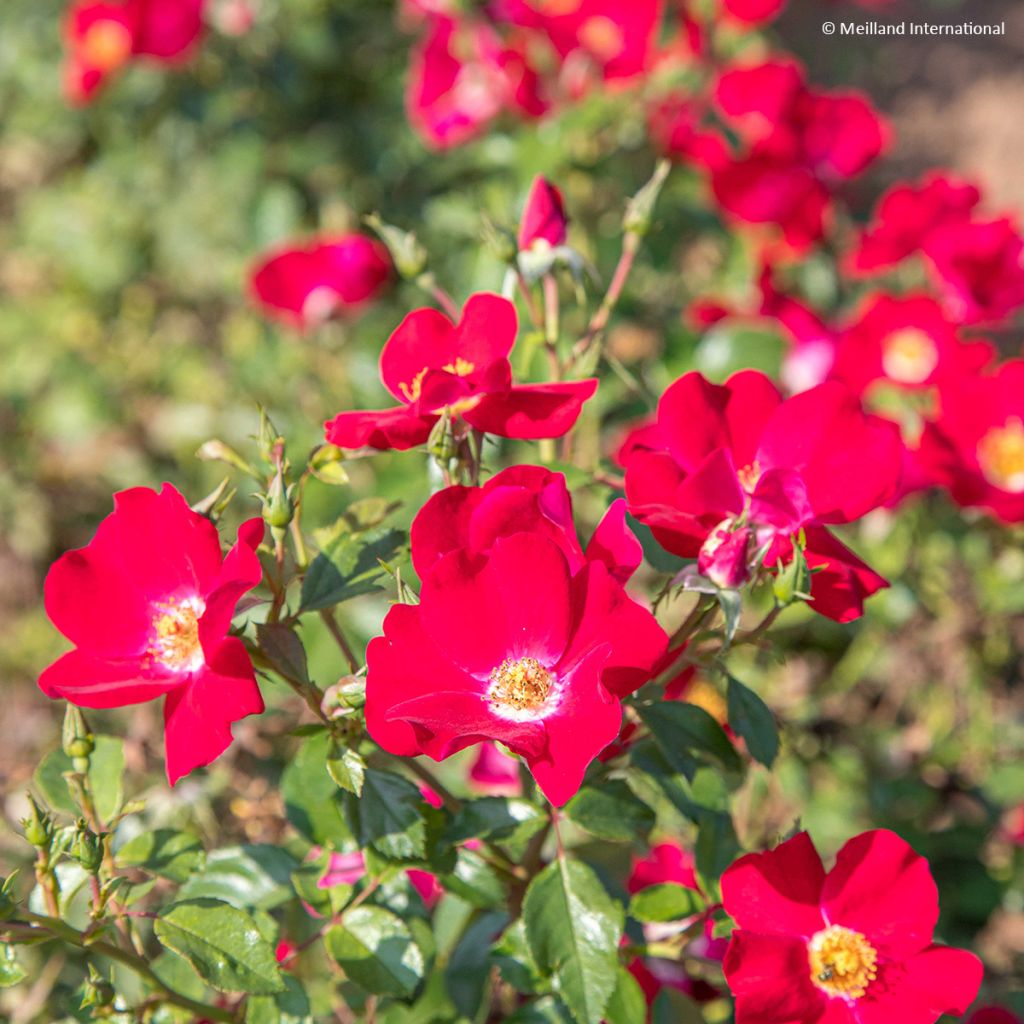

Rosa x polyantha Friendly 'Red Meiariba' - Polyantha Rose


Rosa x polyantha Friendly 'Red Meiariba' - Polyantha Rose
Rosa x polyantha Friendly 'Red Meiariba' - Polyantha Rose
Rosa x polyantha Friendly® Red Meiariba
Thank you to the individuals (for order preparation and shipping), the rose bush I received appears healthy. Planted near the 'Friendly Pink' variety, I am now patiently waiting for it to take root...or not?
Thierry, 22/12/2023
Special offer!
Receive a €20 voucher for any order over €90 (excluding delivery costs, credit notes, and plastic-free options)!
1- Add your favorite plants to your cart.
2- Once you have reached €90, confirm your order (you can even choose the delivery date!).
3- As soon as your order is shipped, you will receive an email containing your voucher code, valid for 3 months (90 days).
Your voucher is unique and can only be used once, for any order with a minimum value of €20, excluding delivery costs.
Can be combined with other current offers, non-divisible and non-refundable.
Home or relay delivery (depending on size and destination)
Schedule delivery date,
and select date in basket
This plant carries a 6 months recovery warranty
More information
We guarantee the quality of our plants for a full growing cycle, and will replace at our expense any plant that fails to recover under normal climatic and planting conditions.
Description
The Friendly 'Red Meiariba' Rosebush is part of a series created by Meilland that is driven by ecological and aesthetic values. This one produces intense cardinal red wild rose flowers, slightly marked with white in the centre, adorned with yellow stamens. Rich in pollen and nectar, before transforming into vermilion red hips, they bring joy to pollinators and birds. Very easy to grow and highly disease-resistant, this bush rose is the friend of natural, ecological gardens with a rustic or slightly wild spirit.
The Friendly 'Red Meiariba' Rosebush bears flowers grouped in terminal clusters, from 3 to 25 units, which come from the polyantha rose, an old hybrid derived from Rosa multiflora and R. chinensis. It is part of the Meillandecor® landscape roses series, offering plants with exceptional natural resistance to diseases and pests, with an almost permanent decorative effect, dense vegetation, and abundant and long-lasting flowering until the first frost. The roses in the Friendly range have a very bushy habit, as wide as tall, reaching around 80 cm (32in) to 1m (3ft) in all directions when mature. They develop deciduous, matte, green foliage, absent in winter. The single flowers with a diameter of 5 to 6 cm (2in), with five petals, have the appearance of ancestral wild roses. They bloom in large numbers in wide pyramidal clusters from May to October-November, as long as there is no frost. The colour of 'Red Meiariba' is an intense red, barely marked with white in the centre.
This Friendly 'Red Meiariba' Rosebush is part of an ecological approach in the garden, where phytosanitary treatments are unnecessary, wildlife is welcome, and flowering is guaranteed. Maintenance is limited to occasional watering during dry periods and annual pruning. The hardy and versatile plant thrives in any climate and soil that is not too dry or poor. It blends well in flower beds, low hedges, or groups of 3. Choose diverse shrubs to accompany it, such as evergreen Ceanothus, Vitex, and buddleias. Add perennial and self-seeding annual plants with the same philosophy, melliferous and low-maintenance, naturalising bulbs and grasses.
Report an error about the product description
Plant habit
Flowering
Foliage
Botanical data
Rosa
x polyantha
Friendly® Red Meiariba
Rosaceae
Cultivar or hybrid
Planting and care
Rose bushes thrive in sunny locations that receive at least 4 to 5 hours of sun per day. However, they should be sheltered from the harsh midday sun and strong winds. Loose, permeable, and humus-rich soil is ideal for rose bushes. They can grow in slightly acidic soil, but they will adapt to any soil that is well-worked and sufficiently rich. To plant a rose bush in a pot, prepare the soil to a depth of 25 cm (10 inches) by crumbling the soil and adding a base amendment such as blood, fish, and bone at the bottom of the planting hole. Place the plant in the hole, remove it from its pot, and cover the top of the root ball with 3 cm (1 inch) of soil. Fill in the hole and water generously to eliminate air pockets. Regular watering is necessary for a few weeks in dry weather to facilitate root development. Additionally, remember to provide your rose bush with special rose fertiliser to stimulate plant flowering.
Planting period
Intended location
Care
-
, onOrder confirmed
Reply from on Promesse de fleurs
Haven't found what you were looking for?
Hardiness is the lowest winter temperature a plant can endure without suffering serious damage or even dying. However, hardiness is affected by location (a sheltered area, such as a patio), protection (winter cover) and soil type (hardiness is improved by well-drained soil).

Photo Sharing Terms & Conditions
In order to encourage gardeners to interact and share their experiences, Promesse de fleurs offers various media enabling content to be uploaded onto its Site - in particular via the ‘Photo sharing’ module.
The User agrees to refrain from:
- Posting any content that is illegal, prejudicial, insulting, racist, inciteful to hatred, revisionist, contrary to public decency, that infringes on privacy or on the privacy rights of third parties, in particular the publicity rights of persons and goods, intellectual property rights, or the right to privacy.
- Submitting content on behalf of a third party;
- Impersonate the identity of a third party and/or publish any personal information about a third party;
In general, the User undertakes to refrain from any unethical behaviour.
All Content (in particular text, comments, files, images, photos, videos, creative works, etc.), which may be subject to property or intellectual property rights, image or other private rights, shall remain the property of the User, subject to the limited rights granted by the terms of the licence granted by Promesse de fleurs as stated below. Users are at liberty to publish or not to publish such Content on the Site, notably via the ‘Photo Sharing’ facility, and accept that this Content shall be made public and freely accessible, notably on the Internet.
Users further acknowledge, undertake to have ,and guarantee that they hold all necessary rights and permissions to publish such material on the Site, in particular with regard to the legislation in force pertaining to any privacy, property, intellectual property, image, or contractual rights, or rights of any other nature. By publishing such Content on the Site, Users acknowledge accepting full liability as publishers of the Content within the meaning of the law, and grant Promesse de fleurs, free of charge, an inclusive, worldwide licence for the said Content for the entire duration of its publication, including all reproduction, representation, up/downloading, displaying, performing, transmission, and storage rights.
Users also grant permission for their name to be linked to the Content and accept that this link may not always be made available.
By engaging in posting material, Users consent to their Content becoming automatically accessible on the Internet, in particular on other sites and/or blogs and/or web pages of the Promesse de fleurs site, including in particular social pages and the Promesse de fleurs catalogue.
Users may secure the removal of entrusted content free of charge by issuing a simple request via our contact form.
The flowering period indicated on our website applies to countries and regions located in USDA zone 8 (France, the United Kingdom, Ireland, the Netherlands, etc.)
It will vary according to where you live:
- In zones 9 to 10 (Italy, Spain, Greece, etc.), flowering will occur about 2 to 4 weeks earlier.
- In zones 6 to 7 (Germany, Poland, Slovenia, and lower mountainous regions), flowering will be delayed by 2 to 3 weeks.
- In zone 5 (Central Europe, Scandinavia), blooming will be delayed by 3 to 5 weeks.
In temperate climates, pruning of spring-flowering shrubs (forsythia, spireas, etc.) should be done just after flowering.
Pruning of summer-flowering shrubs (Indian Lilac, Perovskia, etc.) can be done in winter or spring.
In cold regions as well as with frost-sensitive plants, avoid pruning too early when severe frosts may still occur.
The planting period indicated on our website applies to countries and regions located in USDA zone 8 (France, United Kingdom, Ireland, Netherlands).
It will vary according to where you live:
- In Mediterranean zones (Marseille, Madrid, Milan, etc.), autumn and winter are the best planting periods.
- In continental zones (Strasbourg, Munich, Vienna, etc.), delay planting by 2 to 3 weeks in spring and bring it forward by 2 to 4 weeks in autumn.
- In mountainous regions (the Alps, Pyrenees, Carpathians, etc.), it is best to plant in late spring (May-June) or late summer (August-September).
The harvesting period indicated on our website applies to countries and regions in USDA zone 8 (France, England, Ireland, the Netherlands).
In colder areas (Scandinavia, Poland, Austria...) fruit and vegetable harvests are likely to be delayed by 3-4 weeks.
In warmer areas (Italy, Spain, Greece, etc.), harvesting will probably take place earlier, depending on weather conditions.
The sowing periods indicated on our website apply to countries and regions within USDA Zone 8 (France, UK, Ireland, Netherlands).
In colder areas (Scandinavia, Poland, Austria...), delay any outdoor sowing by 3-4 weeks, or sow under glass.
In warmer climes (Italy, Spain, Greece, etc.), bring outdoor sowing forward by a few weeks.





























